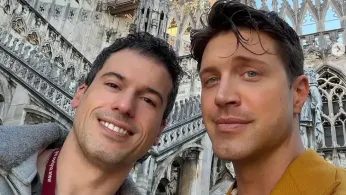
4 hours ago
Gio Benitez’s Radiant Homecoming: Queer Love, Faith, and an Unlikely Baptismal Rebirth
READ TIME: 15 MIN.
When Gio Benitez—known to millions as the charismatic anchor of Good Morning America—stepped to the altar at St. Paul the Apostle’s in Midtown Manhattan, he wasn’t just returning to a faith he’d left behind 25 years ago. He was rewriting the script for queer Catholics everywhere. The church, long a battleground for affirmation and acceptance, witnessed a different kind of miracle: a joyful homecoming, with Gio’s husband Tommy DiDario standing proudly as sponsor and partner in faith .
The scene was intimate, but every detail pulsed with meaning. Friends and family filled the pews. The hymn “How Beautiful,” sung by Alison McCartan, soared across the sanctuary as Gio—tears glimmering—received the sacrament of Confirmation, a ritual that for many LGBTQ+ people has felt out of reach. “When we’re able to love and love freely and openly—and love ourselves as well—we are a long way down the road to fulfilling the Kingdom of God,” preached Fr. Eric Andrews as the Mass began, his words echoing the kind of radical welcome that has too often been the exception, not the rule .
For Benitez, the journey back to Catholicism was neither linear nor easy. Baptized alongside his mother at 15, he soon drifted away, haunted by the question so many of us have whispered: “If God created me, how could He not love me?” . It took decades—and a spark ignited by the death of Pope Francis and the inclusive ministry of Jesuit Fr. James Martin—for Gio to consider that the Church might finally be able to hold space for his whole self.
On social media, Benitez was candid about the vulnerability and hope that marked his return. “Six months ago, the death of a humble pope unexpectedly took me on a journey that was a lifetime in the making,” he wrote. That journey led him through the doors of St. Paul’s, a community where open arms replaced old wounds.
The moment of anointing—oil on his forehead, the warmth of loved ones, Tommy’s steady presence—was as much about personal healing as about sacred tradition. Benitez described the experience as a profound shift: “It turns out proof of God’s love wasn’t in books or lectures. That divine love was in me all along, gently reaching out with arms wide open,” he reflected .
For LGBTQ+ Catholics, the Church has too often been a site of exile. But Benitez’s ceremony, set against the backdrop of Fr. Martin’s ministry and the Vatican’s slowly widening embrace—like the recent approval of an LGBTQ Catholic pilgrimage to St. Peter’s Basilica for Jubilee—signals a new, if halting, era .
Gio’s story lands at the intersection of faith and queer resilience. It’s about the courage to “walk through the doors” after years of exclusion, the audacity to imagine a church where you don’t have to hide or edit yourself. “I found the Ark of the Covenant in my heart, stored there by the One who created me… exactly as I am,” Gio shared—a line that could hang above the altar of every affirming congregation .
This isn’t just a personal milestone; it’s a cultural moment. Every LGBTQ+ person who has ever wondered if there’s room for them at the table finds a measure of belonging in Gio’s journey. The “cloud of witnesses” he imagined—grandparents, lost friends, generations of queer Catholics—are all there, invisible but palpable, praying with and for him.
As the ceremony ended, Benitez’s gratitude was directed at the priests and mentors who guided him: “My deepest gratitude to Fr. Eric Andrews, Fr. James Martin, Fr. Paul Rospond, and Fr. Chris Lawton for showing me that God’s loving mercy is unconditional,” he wrote . That phrase—God’s loving mercy is unconditional—is a radical balm for queer Catholics who have too often been told the opposite.
What makes this story so resonant isn’t just that a celebrity found his way back to faith. It’s that he did so *as himself,* with his queer family by his side, in a community that met him with welcome, not erasure. The significance is not lost on those who have spent years waiting for the Church’s doors to open. In Benitez’s story, we see the possibility that faith and queerness can not only coexist, but can thrive together—creating a homecoming that’s both ancient and utterly new.
For a generation of LGBTQ+ people navigating the fraught terrain of spirituality, Gio Benitez’s radiant return is more than news—it’s a signpost, a hymn, a quiet revolution sung in the language of love.






